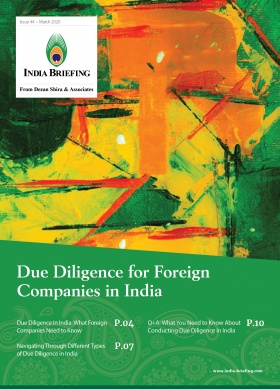India Bans TikTok and 58 Other Chinese Apps from Their Domestic Market. Is it a Big Deal?
Op/Ed by Chris Devonshire-Ellis
The decision made yesterday by the Indian government to bar from the domestic market 59 Chinese developed apps, including popular products, such as TikTok and products from Xiaomi and Alibaba, has raised commercial and trade tensions between the two countries just after a frankly murderous melee between Indian and Chinese soldiers in the Galwan Valley. Mainstream media are linking the two events as a conclusion that New Delhi is somehow punishing Beijing for the military fight, during which 20 Indian soldiers died. But is that the whole story? And is it such a big deal?
The Indian government statement reads, “The Ministry of Information Technology, invoking its power under section 69A of the Information Technology Act read with the relevant provisions of the Information Technology (Procedure and Safeguards for Blocking of Access of Information by Public) Rules 2009 and in view of the emergent nature of threats has decided to block 59 apps since in view of the information available they are engaged in activities which is prejudicial to sovereignty and integrity of India, defence of India, security of state and public order.”
In terms of the domestic market impact, the number of Indian users now unable to access apps such as TikTok is impressive. TikTok’s main product in India is EduTok, an educational app that has attracted 200 million Indian users a month. However, while TikTok is lauded worldwide as being a Chinese firm, this is only partially true. The parent company, Bytedance, while based in Beijing is also supported by American VC firms, such as Kohlberg Kravis Roberts, Sequoia Capital, General Atlantic, as well as Japan’s SoftBank Group and the Hillhouse Capital Group, based in Singapore and seed funded by Yale University.
In addition to this, TikTok’s India-focused EduTok app is driven by Indian domestic companies, such as Vedantu, based in Bangalore, Mumbai’s Toppr, Delhi’s MadeEasy, and GradeUp based in Noida. Clearly, banning Tiktok from India also damages US financial investments as well as Indian service providers. The implication therefore that in doing so, New Delhi can place blame on China yet instigate a government and Indian corporate power grab to push foreign investors out of the country and replace them with mainly Indian backed financiers and App developers.
That’s a hefty argument to make, yet I speak with experience. I established Dezan Shira & Associates Indian offices back in 2001, where we now have a presence in Delhi, Mumbai, and Bangalore. I can speak from experience when I suggest that when operating a foreign owned professional services firm in India, the playing field is far from level when compared to the range of services domestic firms enjoy. Audit, for example, is pretty much off limits to foreign participation, at a time when local Indian firms are often incompetent. Restrictions on the numbers of qualified partners also inhibit practice development. This is a double edged sword; not only is it highly industry protective, it stunts the development of professionals at a time when Indian companies are becoming MNCs. Many of them employ staff patently unqualified and inexperienced to deal with cross-border financials. There will be, in future, increasing scandals at Indian MNCs when incompetence or outright fraud is later uncovered.
India’s corporate culture is also responsible for problems, and has the political clout to derail any attempts to liberalize and allow foreign investment in areas where it can be nudged out of the market. I have seen this numerous times with international clients looking at the Indian market when what appears to be an opportunity instead descends into a mass of regulatory and restrictive problems. It is systematic and multi-layered prohibition. This mindset has damaged the country immensely. What should have been a golden opportunity for India to take the lead from China as the workshop of the world has been lost. Ten years ago, the average age of a Chinese worker was 37, and in India, 23. The country had a huge worker/salary demographic advantage. Yet, consistent problems and restrictive measures, which have ultimately culminated in India withdrawing from the RCEP agreement, have seen the global cheap manufacturing boom begin to head to parts of Africa instead, and especially so after the African Continental Free Trade Agreement was brokered last year.
Concerning other banned apps, it is important to note that Chinese smartphone makers command more than 80 percent of the smartphone market in India, which is the world’s second-largest. That dominant position has now been changed to suit Indian manufacturers. There are lessons here for foreign investors in terms of what the law says is open for foreign investment and sudden government changes that are made that immediately impact negatively upon those. A key moment has arrived where despite India’s foreign investment laws, it should be noted that if India’s domestic corporates are not somehow cut a larger part of the deal, New Delhi can be pressured to act, and is prepared to provide excuses other than trade barriers for doing so. The Galwan Valley incident was an ideal opportunity for Indian corporates to grab back some serious market share.
India is a sovereign state and has the right to ensure its citizens’ data privacy among concerns that Chinese apps were a national security threat. However, it is telling that if India really had legitimate concerns about TikTok’s data handling it could have just requested TikTok and others relocate their data servers inside India and place them under the regulation and monitoring of Indian authorities. That they haven’t taken this rather obvious step showcases who is calling the shots here: Indian business interests, not the military.
There are still opportunities in India and especially in markets where foreign investment is less of a competitive issue – our India offices are in fact having a banner year in absorbing principally American and European investment that has moved away from China and problems with US trade wars. However, there is more to India banning TikTok and other Chinese Apps from the domestic market than meets the eye, and it is less to do about skirmishes in the Galwan Valley than Indian corporates laying down protectionist barriers in a growth market they wish to control and keep largely to themselves. The lesson for foreign investors to learn about India is that market analysis as well as political and competitor due diligence need to be factored into any longer term projections, and Indian businesses as partners – need to be factored into the equation rather more than the legal parameters indicate. If not, they are quite prepared to influence New Delhi to push back.
Related Reading
- Has India Lost its Free Trade Mojo? Or Will Delhi Substitute the RCEP for the EAEU?
- India Becomes Transportation Hub Of China’s Belt & Road Initiative As Co-Investments Increase
 Due Diligence for Foreign Companies in India Foreign companies investing in India are advised to do a due diligence check, especially if entering into a joint venture, merger and acquisition, or partnership. The due diligence process uncovers critical information relating to the business and its management, thus helping investors decide if they should go ahead with their financial deal, or negotiate better terms and conditions, or withdraw their interest from the target entity or deal. While the due diligence process differs in each sector, the process will include an accurate evaluation of the company’s finances and taxes. In this issue of India Briefing, we provide information on conducting due diligence in India. We first focus on what is due diligence, and why foreign companies should engage in this process before investing in India. Next, we discuss different types of due diligence and explain their requirements and importance. Lastly, we answer some frequently asked questions.
Due Diligence for Foreign Companies in India Foreign companies investing in India are advised to do a due diligence check, especially if entering into a joint venture, merger and acquisition, or partnership. The due diligence process uncovers critical information relating to the business and its management, thus helping investors decide if they should go ahead with their financial deal, or negotiate better terms and conditions, or withdraw their interest from the target entity or deal. While the due diligence process differs in each sector, the process will include an accurate evaluation of the company’s finances and taxes. In this issue of India Briefing, we provide information on conducting due diligence in India. We first focus on what is due diligence, and why foreign companies should engage in this process before investing in India. Next, we discuss different types of due diligence and explain their requirements and importance. Lastly, we answer some frequently asked questions.
About Us
India Briefing is produced by Dezan Shira & Associates. The firm assists foreign investors throughout Asia from offices across the world, including in Delhi and Mumbai. Readers may write to india@dezshira.com for business support in India.
- Previous Article India Throws Cat Among US & UK Hawks by Joining Military Parade with Chinese Soldiers in Moscow’s Red Square
- Next Article Developing Prospects for Growing Trade Between India and Brazil






